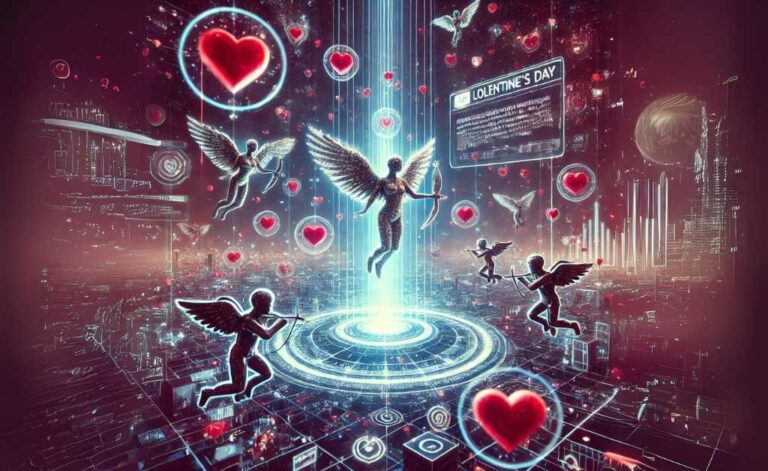Science Behind How & Why We Fall in Love?
1: Introduction & The Neuroscience of Love
The Science of Love & Attraction: How & Why We Fall in Love
Love has fascinated scientists, philosophers, and psychologists for centuries. Is love just an emotion, or is it something deeper—perhaps a biological mechanism that has evolved for human survival and reproduction?
Modern research reveals that romantic love is not just a feeling—it’s a biochemical process that happens in the brain, influenced by hormones, brain activity, and psychological triggers.
This guide will explore:
✔ How love works on a neurological and psychological level
✔ The role of hormones in attraction and commitment
✔ Why we are drawn to some people but not others
✔ How long-term relationships evolve over time
Let’s dive into the science of love and understand what makes our hearts race! 💖
🧠 The Neuroscience of Love: What Happens in the Brain?
Love does not originate in the heart—it happens in the brain. When we experience romantic attraction, our brains activate specific neural pathways, releasing chemicals that influence attraction, passion, and emotional bonding.
1. The Three Stages of Love (Dr. Helen Fisher’s Model)
Renowned biological anthropologist Dr. Helen Fisher identified three phases of love, each controlled by different brain chemicals.
1️⃣ Physical Attraction (Lust) – The First Spark
- Main Hormones: Testosterone, Estrogen
- Brain Function: The hypothalamus triggers sexual desire and initial attraction.
- Effect: Increased confidence, energy, and physical attraction toward potential partners.
💡 Expert Insight:
“Testosterone and estrogen drive initial attraction, influencing confidence, risk-taking, and interest in potential mates.” — Dr. Helen Fisher, Anthropologist
🔹 Real-World Tip:
✔ Engage in self-care, fitness, and good grooming to naturally enhance attraction.
2️⃣ Romantic Excitement (Infatuation) – The “Obsessed” Phase
- Main Brain Chemicals: Dopamine, Serotonin, Norepinephrine
- Brain Function: The reward system releases dopamine, creating feelings of pleasure and excitement.
- Effect: Increased focus, energy, and emotional highs—this is why people feel obsessed with their new partner.
💡 Expert Insight:
“Falling in love activates the same brain pathways as drug addiction, which explains the extreme emotions and hyperfocus on a new partner.” — Dr. Lucy Brown, Neuroscientist
🔹 Real-World Tip:
✔ If you can’t stop thinking about someone, it’s because dopamine makes their presence feel rewarding—similar to the brain’s reaction to gambling wins.
3️⃣ Deep Emotional Bonding (Attachment) – The Long-Term Connection
- Main Brain Chemicals: Oxytocin (“Love Hormone”), Vasopressin
- Brain Function: These chemicals strengthen trust and long-term connection, promoting emotional security in relationships.
- Effect: Reduces stress, increases trust, and strengthens commitment.
💡 Expert Insight:
“Oxytocin, released during bonding experiences like hugging, sex, and deep conversations, creates lasting emotional security.” — Dr. Sue Carter, Relationship Researcher
🔹 Real-World Tip:
✔ Strengthen your oxytocin levels by spending quality time together, engaging in physical touch, and maintaining open communication.
🔬 Additional Research & External Links for Further Reading
🔹 Scientific Studies on Love & the Brain:
- National Institute of Health (NIH) – The Neurobiology of Love
- Harvard University – The Science of Romantic Attraction
- Stanford University – How Love Affects the Brain
🔬 Theories of Love: How Psychologists Explain Relationships
While hormones spark love, psychology explains why some relationships thrive while others fail.
1. Psychologist Robert Sternberg’s Triangular Theory of Love
One of the most widely accepted theories of love comes from psychologist Robert Sternberg, who proposed that love consists of three key components:
1️⃣ Emotional Connection (Intimacy) → Feeling close, safe, and understood.
2️⃣ Physical Passion → Attraction, excitement, and desire.
3️⃣ Commitment → The decision to stay together and invest in the relationship.
💡 Different Types of Love (Based on Sternberg’s Theory)
Type of LoveWhat It IncludesInfatuationPassion OnlyCompanionate LoveEmotional Connection + CommitmentRomantic LoveEmotional Connection + PassionFatuous LovePassion + CommitmentConsummate LoveAll Three Components (Ideal Love)
💡 Expert Insight:
“True love requires emotional connection, passion, and commitment. If one is missing, the relationship may struggle.” — Dr. Robert Sternberg
🔹 Real-World Tip:
✔ If your relationship feels off-balance, identify which component is missing and work on improving it.
📖 Further Reading: Sternberg’s Original Study on Love Theories (APA)
2. Psychologist Zick Rubin’s Similarity-Attraction Effect
Many people believe that opposites attract, but research says otherwise. Psychologist Zick Rubin found that similarity is more important than differences in long-term relationships.
Why Are We Drawn to Similar People?
✔ Shared values create stability → Fewer conflicts, easier understanding.
✔ Familiarity feels safe → The brain prefers patterns it recognizes.
✔ Communication is smoother → Fewer misunderstandings and disagreements.
💡 Expert Insight:
“People may be drawn to exciting differences at first, but shared values and beliefs predict long-term happiness.” — Dr. Zick Rubin
🔹 Real-World Tip:
✔ Instead of focusing on superficial differences, look for someone who shares your long-term goals.
📖 Further Reading: Zick Rubin’s Research on Romantic Love
3. The Mere-Exposure Effect: Why Familiarity Boosts Attraction
Ever noticed how the more you see someone, the more attractive they become? That’s because of the mere-exposure effect, a psychological principle discovered by Robert Zajonc.
🔬 What Does Research Show?
- People tend to prefer things (and people) they see more often.
- Familiarity creates a sense of comfort and trust, increasing attraction.
- This effect is why workplace romances or friendships that turn into love are so common.
💡 Expert Insight:
“The mere-exposure effect explains why we often fall for people we see regularly—familiarity breeds liking and attraction.” — Dr. Robert Zajonc, Social Psychologist
🔹 Real-World Tip:
✔ If you want to build attraction naturally, spend consistent time with someone—it allows the brain to associate them with safety and pleasure.
📖 Further Reading: Psychology Today: The Mere Exposure Effect in Relationships
4. The Role of Reciprocity: Why We Like People Who Like Us
Have you ever found yourself liking someone more after learning they like you? This is because of the reciprocity principle, which says that people are naturally drawn to those who show interest in them.
🔬 What Science Says
- When someone likes us, it boosts our self-esteem, making us more likely to return the affection.
- People tend to mirror emotions—when you express warmth and interest, the other person responds similarly.
- Studies show that mutual attraction is a strong predictor of relationship success.
💡 Expert Insight:
“We unconsciously gravitate toward those who validate our worth, reinforcing reciprocal attraction.” — Dr. Elliot Aronson, Social Psychologist
🔹 Real-World Tip:
✔ Express genuine interest in someone by engaging in meaningful conversations, complimenting them sincerely, and showing warmth. This significantly boosts attraction levels.
📖 Further Reading: The Science of Reciprocal Attraction (Harvard)
💡 Key Takeaways from Response 2:
✔ Love is influenced by psychological factors like familiarity, similarity, and mutual attraction.
✔ The Triangular Theory of Love explains how relationships evolve over time.
✔ Reciprocity and exposure strengthen attraction naturally.
🔍 External Links for Further Reading & Credibility:
🔹 Psychology-Based Love Theories:
- Sternberg’s Triangular Theory of Love (APA)
- Zick Rubin’s Romantic Love Research (SAGE Journals)
- The Mere-Exposure Effect in Dating (Psychology Today)
- The Science of Reciprocity (Harvard Business Review)
🔑 The Four Key Components of Lasting Love
While initial attraction brings people together, long-term love depends on deeper factors that build a strong, lasting connection.
1. Emotional Connection – The Foundation of a Deep Relationship
Love isn’t just about physical attraction—it’s about feeling deeply understood and valued by your partner.
🔬 What Science Says:
- Emotional intimacy is a stronger predictor of relationship success than physical attraction alone.
- Couples who openly share their emotions and thoughts develop deeper trust and bonds.
- Feeling secure, appreciated, and supported increases oxytocin levels, strengthening long-term love.
💡 Expert Insight:
“Emotional intimacy predicts long-term relationship satisfaction more than physical attraction alone.” — Dr. Lisa Firestone, Clinical Psychologist
🔹 Real-World Tips:
✔ Practice active listening – Give your partner undivided attention.
✔ Be vulnerable – Share your thoughts, feelings, and fears openly.
✔ Express appreciation regularly – Acknowledge small acts of kindness to strengthen trust.
📖 Further Reading: The Role of Emotional Intimacy in Romantic Relationships (APA)
2. Physical Attraction & Chemistry – Keeping the Spark Alive
While passion fades over time, attraction can be maintained through affection, touch, and shared experiences.
🔬 What Science Says:
- Couples who engage in regular physical affection (hugging, kissing, hand-holding) report higher relationship satisfaction.
- Sexual attraction remains important, even in long-term relationships.
- Dopamine and oxytocin release during physical intimacy reinforces emotional bonding.
💡 Expert Insight:
“Attraction can last if partners actively nurture physical and emotional closeness.” — Dr. John Gottman, Relationship Expert
🔹 Real-World Tips:
✔ Prioritize physical closeness – Small gestures (like holding hands or hugging) strengthen connection.
✔ Maintain intimacy – Schedule quality time together, even if life gets busy.
✔ Surprise your partner with compliments and spontaneous affection.
📖 Further Reading: The Importance of Physical Touch in Relationships (Harvard)
3. Shared Life Goals & Values – The Foundation of Commitment
A successful relationship requires more than love—it needs aligned life goals and values.
🔬 What Science Says:
- Couples with similar long-term goals experience fewer conflicts.
- Opposing views on major topics (finance, parenting, lifestyle) lead to higher breakup rates.
- Shared values create a sense of partnership and stability.
💡 Expert Insight:
“Couples who share similar long-term goals have fewer conflicts and greater relationship satisfaction.” — Dr. John Gottman
🔹 Real-World Tips:
✔ Discuss future plans early – Talk about career, family, and personal growth goals.
✔ Align financial habits – Money disagreements are a leading cause of relationship stress.
✔ Support each other’s dreams – Help each other grow and evolve.
📖 Further Reading: The Role of Shared Values in Relationship Longevity (SAGE Journals)
4. Relationship Growth – Why Love Needs Effort
Many people think love should be effortless, but the truth is, relationships require work.
🔬 What Science Says:
- Successful couples grow together instead of drifting apart.
- Making time for each other strengthens connection.
- Overcoming challenges together builds resilience.
💡 Expert Insight:
“Couples who actively work on their relationship and prioritize each other tend to have longer-lasting love.” — Dr. Sue Johnson, Relationship Psychologist
🔹 Real-World Tips:
✔ Spend time together – Prioritize date nights and shared activities.
✔ Handle conflict with care – Use open, honest communication instead of avoiding problems.
✔ Adapt and grow together – Support each other through life’s changes.
📖 Further Reading: How to Make Love Last (Psychology Today)
💡 Key Takeaways from Response 3:
✔ Emotional connection is the foundation of a deep and lasting relationship.
✔ Physical intimacy helps maintain attraction over time.
✔ Shared values and goals are key to long-term compatibility.
✔ Love requires ongoing effort, growth, and commitment.
🔍 External Links for Further Reading & Credibility:
🔹 Psychology-Based Relationship Research:
- Emotional Intimacy in Relationships (APA)
- Physical Touch & Emotional Well-Being (Harvard)
- The Science of Shared Values in Love (SAGE)
- How to Make Love Last (Psychology Today)
Understanding the Psychology of Love & Its Key Components
The Psychology of Love: How Intimacy, Passion, and Commitment Play a Role
Love is more than just a feeling—it follows patterns that psychologists have studied for years. According to the psychology of love, different forms of love exist based on three key factors:
✔ Intimacy → Emotional closeness and trust.
✔ Passion → Physical attraction and excitement.
✔ Commitment → The decision to stay together long-term.
Each component of love plays a role in shaping how relationships develop.
Different Forms of Love: How the Three Components Combine
Depending on which elements are present, love takes on different forms.
| Form of Love | Intimacy (Emotional Bonding) | Passion (Physical Attraction) | Commitment (Long-Term Stability) |
| Infatuation | ❌ | ✅ | ❌ |
| Liking (Friendship) | ✅ | ❌ | ❌ |
| Romantic Love | ✅ | ✅ | ❌ |
| Companionate Love | ✅ | ❌ | ✅ |
| Fatuous Love | ❌ | ✅ | ✅ |
| Consummate Love | ✅ | ✅ | ✅ |
💡 What Does This Mean?
✔ Infatuation is mostly physical attraction with no deep emotional bond.
✔ Romantic love has both closeness and passion but may lack long-term stability.
✔ Companionate love is often found in long-term friendships or marriages where passion has faded.
✔ Consummate love is the most balanced and fulfilling type, but it requires effort to maintain all three components.
What is Consummate Love & Why Is It Ideal?
💡 Consummate love happens when all three elements—intimacy, passion, and commitment—are present.
✔ Intimacy → Builds trust and deep emotional bonding.
✔ Passion → Keeps excitement and attraction alive.
✔ Commitment → Ensures stability and long-term happiness.
💡 Expert Insight:
“Consummate love is rare because it requires ongoing effort in all three areas. Without attention, one component may fade over time.” — Dr. Robert Sternberg
🔹 Real-World Tips to Maintain Consummate Love:
✔ Keep communication open – Talk about feelings, challenges, and goals.
✔ Maintain physical intimacy – Hugs, kisses, and small gestures keep attraction strong.
✔ Show appreciation – Express gratitude for your partner’s efforts.
📖 Further Reading: Understanding Love’s Components (APA)
💡 Key Takeaways:
✔ Love is not just one thing—it has different forms depending on intimacy, passion, and commitment.
✔ Consummate love is the most balanced and ideal form, but it takes effort to maintain.
✔ Every relationship can evolve—understanding these components helps build stronger, lasting love.
📖 Further Reading: The Science of Long-Term Love (Psychology Today)
💡 Frequently Asked Questions (FAQs) About Love & Attraction
1. What is the difference between passionate love and companionate love?
✔ Passionate love is intense, emotional, and focused on physical attraction and excitement. It is strongest in the early stages of a relationship.
✔ Companionate love is built on trust, deep emotional connection, and shared experiences. It’s what sustains long-term relationships.
💡 Expert Insight:
“Passionate love fades over time, but companionate love deepens, creating emotional security and long-term happiness.” — Dr. Robert Sternberg
📖 Further Reading: Sternberg’s Triangular Theory of Love (APA)
2. How does the brain change in long-term love?
✔ Early romantic love is driven by dopamine, creating excitement and obsession.
✔ Over time, oxytocin and vasopressin take over, promoting emotional bonding and trust.
✔ Long-term partners experience reduced stress and better emotional stability.
💡 Expert Insight:
“Romantic relationships activate brain regions associated with reward and attachment, reinforcing long-term commitment.” — Dr. Helen Fisher
📖 Further Reading: The Neurobiology of Love (NIH)
3. Why do breakups feel so painful?
✔ Losing a loved one triggers withdrawal from dopamine, oxytocin, and serotonin, similar to drug withdrawal.
✔ The brain processes heartbreak similarly to physical pain, making breakups feel intense.
✔ Emotional detachment takes time and self-care to heal.
💡 Expert Insight:
“The pain of a breakup is real—your brain is literally going through withdrawal from a love ‘addiction’.” — Dr. Lucy Brown, Neuroscientist
📖 Further Reading: How Heartbreak Affects the Brain (Harvard)
4. Can love be scientifically measured?
✔ Yes! fMRI scans show distinct brain activity patterns when people view photos of their romantic partners.
✔ Scientists can predict relationship longevity based on brain activation in areas related to attachment.
💡 Expert Insight:
“Love is not just an emotion—it’s a neurological process we can observe and measure.” — Dr. Stephanie Cacioppo, Neuroscientist
📖 Further Reading: How Love Works in the Brain (Stanford University)
5. How can couples keep the spark alive?
✔ Try new experiences together – Novelty increases dopamine, rekindling attraction.
✔ Prioritize physical touch – Hugging, kissing, and intimacy boost oxytocin.
✔ Keep communication open – Honest conversations maintain emotional closeness.
💡 Expert Insight:
“The happiest couples continuously invest in their relationship by exploring new activities and strengthening their emotional and physical connection.” — Dr. John Gottman
📖 Further Reading: Keeping Love Strong Over Time (Psychology Today)
📌 Final Takeaways: How to Build Stronger, Science-Backed Relationships
By understanding the science of love, we can:
✔ Enhance attraction by recognizing how hormones shape emotions.
✔ Strengthen relationships by fostering emotional intimacy and trust.
✔ Make smarter dating decisions by prioritizing shared values and long-term compatibility.
💡 Final Thought:
Love isn’t just about feelings—it’s a mix of biology, psychology, and behavior. When we understand how love works, we can build deeper, healthier, and more fulfilling relationships.
🔍 External Links for Further Reading & Credibility
🔹 Neuroscience of Love:
- The Neurobiology of Love (NIH)
- How Love Works in the Brain (Stanford University)
🔹 Psychology-Based Love Theories:
- Sternberg’s Triangular Theory of Love (APA)
- Zick Rubin’s Romantic Love Research (SAGE Journals)
- The Mere-Exposure Effect in Dating (Psychology Today)
🔹 Long-Term Relationship Success:
- How to Make Love Last (Psychology Today)
- Keeping Love Strong Over Time (Harvard)







